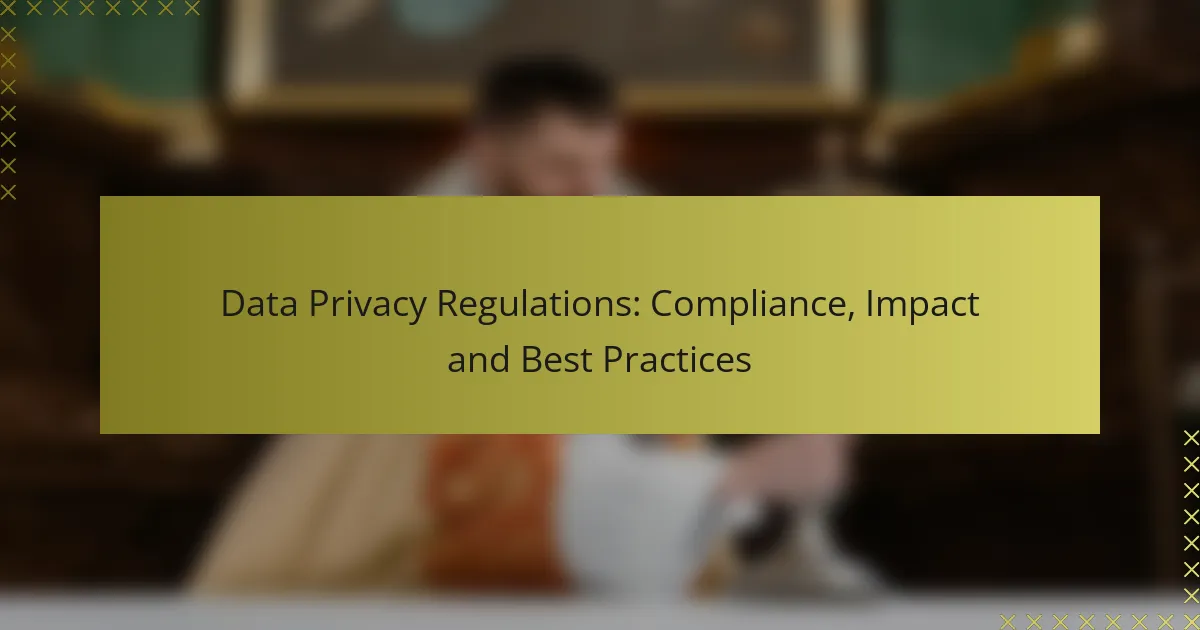Data privacy regulations play a crucial role in safeguarding personal information and upholding consumer rights across various sectors. In the United States, laws such as the California Consumer Privacy Act (CCPA) and the Health Insurance Portability and Accountability Act (HIPAA) set specific compliance requirements that businesses must navigate. By adopting structured processes and robust data protection policies, organizations can not only ensure compliance but also enhance customer trust and mitigate potential risks.
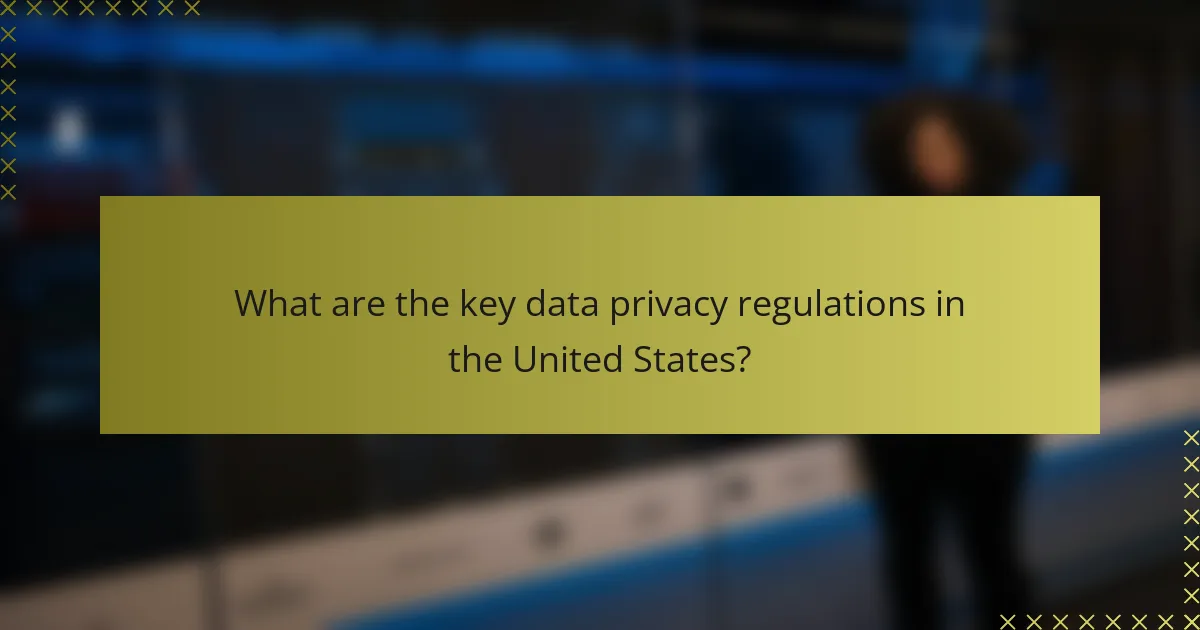
What are the key data privacy regulations in the United States?
The key data privacy regulations in the United States include several laws designed to protect personal information and ensure consumer rights. These regulations vary by sector and state, with notable examples being the California Consumer Privacy Act (CCPA), the Health Insurance Portability and Accountability Act (HIPAA), and the Children’s Online Privacy Protection Act (COPPA).
California Consumer Privacy Act (CCPA)
The California Consumer Privacy Act (CCPA) grants California residents specific rights regarding their personal data. Under the CCPA, consumers can request information about the personal data collected by businesses, opt out of the sale of their data, and request deletion of their data.
Businesses must comply with CCPA by providing clear privacy notices and ensuring that consumers can easily exercise their rights. Non-compliance can result in significant fines, making it essential for companies operating in California to understand and implement these regulations effectively.
Health Insurance Portability and Accountability Act (HIPAA)
The Health Insurance Portability and Accountability Act (HIPAA) protects sensitive patient health information from being disclosed without the patient’s consent. HIPAA applies to healthcare providers, health plans, and healthcare clearinghouses, collectively known as covered entities.
Under HIPAA, covered entities must implement safeguards to ensure the confidentiality, integrity, and availability of protected health information (PHI). This includes administrative, physical, and technical safeguards, as well as training for employees on data privacy practices.
Children’s Online Privacy Protection Act (COPPA)
The Children’s Online Privacy Protection Act (COPPA) is designed to protect the privacy of children under the age of 13 online. COPPA requires websites and online services directed at children to obtain verifiable parental consent before collecting personal information from minors.
Compliance with COPPA involves clear privacy policies, parental notifications, and mechanisms for parents to review and delete their children’s information. Failure to comply can lead to hefty fines and legal repercussions, making it crucial for businesses targeting children to adhere to these regulations.
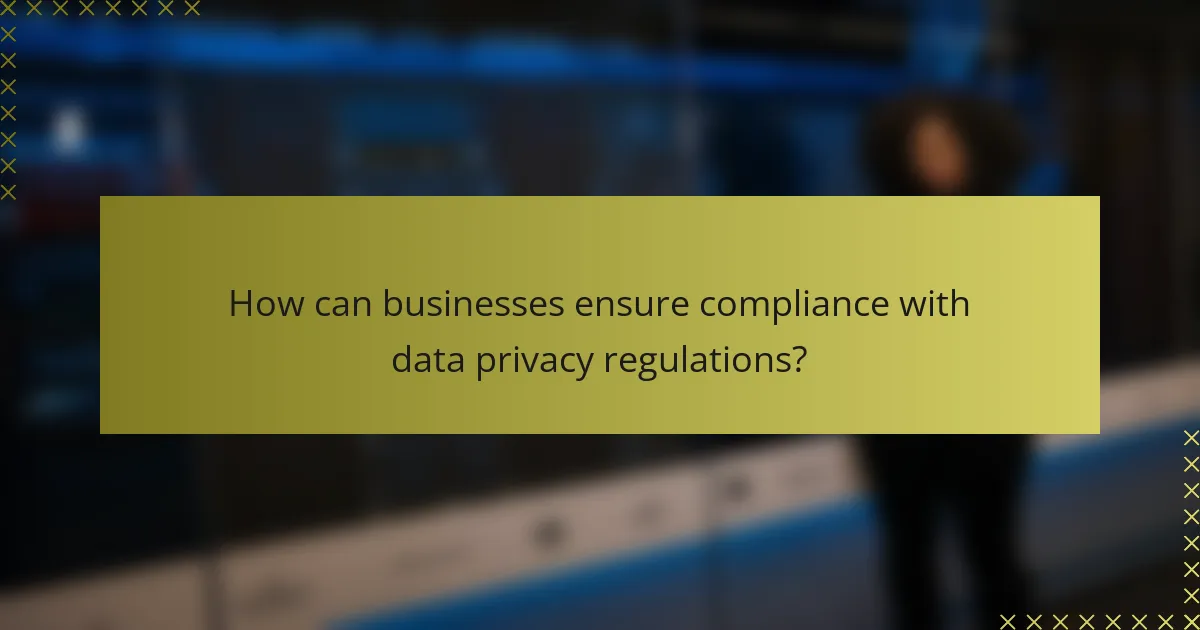
How can businesses ensure compliance with data privacy regulations?
Businesses can ensure compliance with data privacy regulations by implementing structured processes that include regular audits, robust data protection policies, and comprehensive employee training. These steps help organizations manage data responsibly and mitigate risks associated with non-compliance.
Conduct regular data audits
Regular data audits are essential for identifying and addressing compliance gaps. Businesses should schedule these audits at least annually, but more frequent assessments may be necessary depending on the volume of data processed and the complexity of operations.
During an audit, companies should evaluate data collection practices, storage methods, and sharing protocols. This process helps ensure that data handling aligns with applicable regulations, such as GDPR or CCPA, and highlights areas for improvement.
Implement data protection policies
Establishing clear data protection policies is crucial for guiding employee behavior and ensuring compliance. These policies should outline how data is collected, used, stored, and shared, as well as the consequences of non-compliance.
Organizations should regularly review and update their policies to reflect changes in regulations and technology. Engaging legal counsel can help ensure that policies meet legal requirements and industry best practices.
Train employees on data privacy
Employee training on data privacy is vital for fostering a culture of compliance. All staff members should receive training on data protection policies, the importance of data privacy, and their specific responsibilities regarding data handling.
Training sessions should be conducted regularly, with updates provided as regulations change. Utilizing real-life scenarios can enhance understanding and retention, ensuring employees are prepared to handle data responsibly.
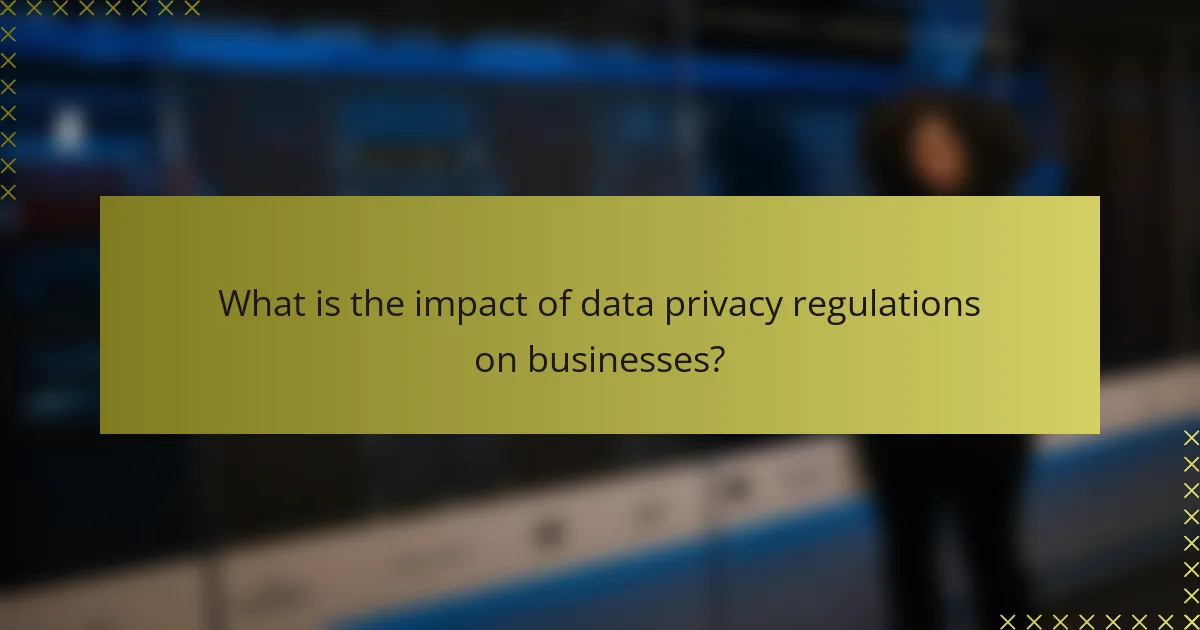
What is the impact of data privacy regulations on businesses?
Data privacy regulations significantly affect businesses by imposing compliance requirements that can reshape operations, enhance customer relationships, and introduce financial risks. Companies must navigate these regulations to avoid penalties while leveraging them to build trust with consumers.
Increased operational costs
Compliance with data privacy regulations often leads to increased operational costs for businesses. Organizations may need to invest in new technologies, hire specialized personnel, and conduct regular audits to ensure adherence to regulations like GDPR or CCPA.
For instance, implementing robust data protection measures can require spending in the range of thousands to millions of dollars, depending on the size and complexity of the business. Companies should budget for these expenses as part of their operational planning.
Enhanced customer trust
Adhering to data privacy regulations can enhance customer trust, as consumers are increasingly concerned about how their personal information is handled. When businesses demonstrate a commitment to protecting customer data, they can foster loyalty and improve their brand reputation.
For example, companies that transparently communicate their data handling practices and provide customers with control over their information often see higher engagement and retention rates. This trust can translate into a competitive advantage in the marketplace.
Legal penalties for non-compliance
Failure to comply with data privacy regulations can result in significant legal penalties, including hefty fines and sanctions. For instance, GDPR violations can lead to fines of up to 4% of annual global revenue or €20 million, whichever is greater.
Businesses must stay informed about the specific regulations applicable to their operations and implement necessary compliance measures to mitigate risks. Regular training for employees and periodic reviews of data practices can help prevent costly violations.

What are best practices for data privacy management?
Best practices for data privacy management involve implementing strategies that protect personal data while ensuring compliance with relevant regulations. Key practices include adopting a privacy-by-design approach, utilizing encryption for sensitive data, and regularly updating privacy policies to reflect changes in laws and technology.
Adopt a privacy-by-design approach
A privacy-by-design approach integrates data protection into the development of business processes and systems from the outset. This proactive strategy ensures that privacy considerations are embedded in the design phase, minimizing risks and enhancing user trust.
To implement this approach, conduct privacy impact assessments during project planning and involve stakeholders in discussions about data handling practices. This can help identify potential privacy issues early and address them effectively.
Utilize encryption for sensitive data
Encryption is a critical tool for protecting sensitive data from unauthorized access. By converting data into a secure format that can only be read with a decryption key, organizations can safeguard personal information both in transit and at rest.
Consider using strong encryption standards, such as AES-256, for data storage and SSL/TLS protocols for data transmission. Regularly review and update encryption methods to stay ahead of evolving security threats.
Regularly update privacy policies
Regular updates to privacy policies are essential for maintaining transparency and compliance with changing regulations. Organizations should review their policies at least annually or whenever significant changes occur in data handling practices or legal requirements.
Ensure that privacy policies are clear, concise, and accessible to users. Include information on data collection, usage, sharing practices, and user rights. This helps build trust and informs users about how their data is being managed.

What frameworks can help in selecting data privacy solutions?
Frameworks such as Privacy Impact Assessments (PIA) and Data Protection Impact Assessments (DPIA) provide structured approaches to identify and mitigate risks associated with data privacy. These tools help organizations evaluate their data handling practices and ensure compliance with relevant regulations.
Privacy Impact Assessment (PIA)
A Privacy Impact Assessment (PIA) is a process that helps organizations assess how their projects or systems impact the privacy of individuals. It typically involves identifying personal data collected, evaluating the necessity of data processing, and determining potential risks to privacy.
When conducting a PIA, organizations should consider key factors such as the type of data being processed, the purpose of data collection, and the potential impact on individuals’ privacy rights. A well-executed PIA can guide decision-making and enhance transparency.
Common pitfalls include failing to involve stakeholders early in the process and neglecting to update the PIA as projects evolve. Regular reviews and updates are essential to maintain compliance and address new risks.
Data Protection Impact Assessment (DPIA)
A Data Protection Impact Assessment (DPIA) is a more comprehensive evaluation required under regulations like the GDPR for processing activities that pose high risks to individuals’ rights. It focuses on assessing the necessity and proportionality of data processing and identifying measures to mitigate risks.
To conduct a DPIA, organizations should outline the nature of the data processing, assess potential risks, and document measures taken to protect personal data. Engaging with data subjects and stakeholders can provide valuable insights into privacy concerns.
Organizations should avoid common mistakes such as underestimating the complexity of data flows and failing to document the assessment process thoroughly. A detailed DPIA not only aids compliance but also builds trust with customers and stakeholders.
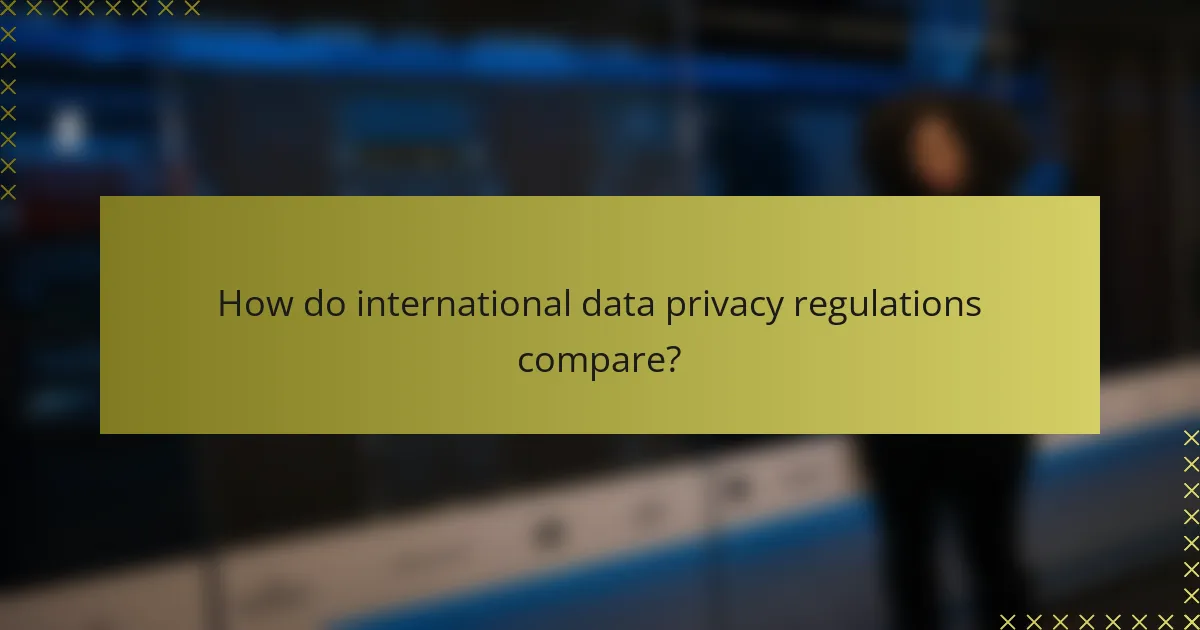
How do international data privacy regulations compare?
International data privacy regulations vary significantly in their scope, requirements, and enforcement mechanisms. Understanding these differences is crucial for organizations operating across borders to ensure compliance and protect user data effectively.
General Data Protection Regulation (GDPR)
The GDPR is a comprehensive data protection regulation in the European Union that sets strict guidelines for the collection and processing of personal information. It applies to any organization that handles data of EU citizens, regardless of the organization’s location.
Key requirements include obtaining explicit consent from individuals for data processing, ensuring data portability, and implementing the right to be forgotten. Organizations must also appoint a Data Protection Officer (DPO) if they process large amounts of personal data.
Failure to comply with GDPR can result in hefty fines, typically up to 4% of annual global revenue or €20 million, whichever is higher. Companies should regularly audit their data practices and ensure transparency in their data handling processes.
Personal Information Protection and Electronic Documents Act (PIPEDA)
PIPEDA is Canada’s federal privacy law that governs how private sector organizations collect, use, and disclose personal information in the course of commercial activities. It applies to all organizations in Canada, with certain exceptions for public bodies and provinces with their own privacy laws.
Under PIPEDA, organizations must obtain consent for data collection and provide individuals with access to their personal information. They are also required to implement reasonable safeguards to protect data and to be transparent about their data handling practices.
Non-compliance with PIPEDA can lead to investigations by the Office of the Privacy Commissioner of Canada and potential legal actions. Organizations should ensure they have clear privacy policies and training programs in place to foster a culture of compliance.

What emerging trends are shaping data privacy regulations?
Emerging trends in data privacy regulations are increasingly focused on consumer rights, transparency, and accountability. These trends reflect a growing recognition of the importance of personal data protection in a digital economy.
Increased consumer rights and control
Consumers are gaining more rights regarding their personal data, including the ability to access, correct, and delete their information. Regulations like the GDPR in Europe and CCPA in California exemplify this shift, granting individuals greater control over their data.
Organizations must implement processes to facilitate these rights, which may involve updating privacy policies and enhancing data management systems. Failure to comply can result in significant fines and reputational damage.
Focus on data minimization
Data minimization is becoming a key principle in privacy regulations, encouraging organizations to collect only the data necessary for specific purposes. This approach not only protects consumer privacy but also reduces the risk of data breaches.
Companies should regularly assess their data collection practices and eliminate unnecessary data storage. Establishing clear data retention policies can help in adhering to this principle while ensuring compliance with regulations.
Emphasis on transparency and accountability
Transparency in data handling practices is increasingly mandated by regulations, requiring organizations to clearly communicate how they collect, use, and share personal data. This includes providing detailed privacy notices and obtaining explicit consent from users.
To enhance accountability, companies are encouraged to appoint data protection officers and conduct regular audits of their data practices. This proactive approach not only builds trust with consumers but also helps mitigate legal risks.
Global harmonization of regulations
As data privacy concerns grow worldwide, there is a trend towards harmonizing regulations across different jurisdictions. This aims to simplify compliance for multinational organizations and create a more consistent framework for data protection.
Businesses operating in multiple regions should stay informed about varying regulations and consider adopting a unified privacy strategy that meets the strictest requirements. This can streamline operations and reduce compliance costs.
